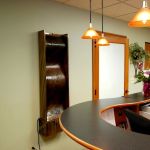What Happens in a Dental Emergency Clinic Visit: A Complete Guide
- 1. What is a Dental Emergency?
- 2. Signs You Need Emergency Dental Care
- 3. What Happens During a Dental Emergency Clinic Visit?
- 4. Common Dental Emergencies
- 5. How to Prepare for a Dental Emergency Visit
- 6. How to Choose the Right Emergency Dental Clinic
1. What is a Dental Emergency?
A dental emergency is any situation that requires immediate attention from a dentist. This could include traumatic injuries, severe pain, or infections that could lead to complications if not treated promptly. Dental emergencies often occur suddenly, leaving you in discomfort or distress, and it's essential to act quickly to prevent further damage.
Some common dental emergencies include broken teeth, abscesses, severe toothaches, and knocked-out teeth. It's important to seek professional help right away when these issues arise.
2. Signs You Need Emergency Dental Care
Knowing when to seek urgent dental care is crucial. Below are some signs that indicate you may need to visit a dental emergency clinic:
- Severe Toothache: Persistent and excruciating pain that doesn't subside with over-the-counter pain relievers.
- Chipped or Broken Tooth: If you have a tooth that has been damaged or broken, you should visit a clinic to prevent further injury and infection.
- Knocked-Out Tooth: A knocked-out tooth should be addressed immediately, as reimplantation is often successful if done within an hour.
- Gum Swelling or Abscess: Swelling or pus around your gums can indicate an infection that needs immediate treatment.
- Bleeding Gums: Uncontrolled bleeding after a traumatic event or while eating can be a sign of a dental emergency.
3. What Happens During a Dental Emergency Clinic Visit?
When you arrive at a dental emergency clinic, the process begins with a thorough assessment. Here's a step-by-step breakdown of what typically happens during your visit:
- Initial Consultation: The dentist will ask you about the symptoms you're experiencing and the cause of the emergency. You’ll also be asked about your medical history, any allergies, and any previous dental treatments.
- Examination: The dentist will examine the affected area and may take X-rays to get a better understanding of the extent of the issue. This helps in planning the most effective treatment.
- Pain Management: Pain relief will be administered to make you more comfortable. This may include local anesthesia or other measures to reduce discomfort during the procedure.
- Treatment: The dentist will provide the necessary treatment depending on the emergency. This could involve cleaning and dressing a wound, performing a root canal, reimplanting a knocked-out tooth, or other urgent procedures to address the issue.
- Post-Treatment Care: After the immediate treatment, the dentist will provide instructions on how to care for the affected area. This might include follow-up visits or prescriptions for antibiotics or pain relievers.
4. Common Dental Emergencies
Dental emergencies can happen to anyone, at any time. Below are some of the most common scenarios that require urgent dental care:
- Toothaches: Toothaches are among the most common reasons people seek emergency dental care. They can be caused by cavities, gum disease, or even trauma to the tooth.
- Knocked-Out Tooth: A knocked-out tooth is a serious dental emergency, and prompt action is required to have the best chance of saving the tooth. You should rinse the tooth, keep it moist, and seek care immediately.
- Chipped or Cracked Teeth: If you chip or crack a tooth, the dentist may need to repair it with a filling, crown, or other restoration methods.
- Dental Abscess: A dental abscess is a painful infection that forms at the root of a tooth or between the gums and teeth. If left untreated, it can spread and lead to more severe health problems.
- Lost Fillings or Crowns: If you lose a filling or crown, it can expose the underlying tooth to further damage or infection, making it important to address the issue as soon as possible.
5. How to Prepare for a Dental Emergency Visit
While dental emergencies can happen unexpectedly, there are a few steps you can take to ensure you're prepared:
- Know Your Emergency Dentist's Contact Information: Always keep the contact information of your emergency dentist or clinic handy. Having this information available can save precious time when an emergency arises.
- Keep Emergency Dental Supplies: It's a good idea to have a small dental emergency kit at home. This can include pain relievers, gauze, a small container for a knocked-out tooth, and a cold pack.
- Stay Calm: Dental emergencies can be stressful, but it's important to stay calm. This will help you manage the situation better and make clear decisions about seeking care.
6. How to Choose the Right Emergency Dental Clinic
Choosing the right emergency dental clinic can make a big difference in the quality of care you receive. Here are some factors to consider when selecting a clinic:
- Availability: Ensure the clinic provides 24/7 emergency care or offers extended hours, especially if you're dealing with an urgent situation outside of regular office hours.
- Location: A clinic that's nearby will be more accessible when you're in need of urgent care.
- Qualified Staff: Look for a clinic with experienced emergency dentists who are skilled in handling a wide range of dental emergencies.
- Patient Reviews: Checking online reviews and testimonials can help you gauge the clinic's reputation and quality of service.
If you're looking for expert emergency dental care, visit Dentistry Toothtruth to get in touch with qualified professionals who can provide fast and reliable treatment in your time of need.







 Alliance Orthodontics4.0 (23 review)
Alliance Orthodontics4.0 (23 review) Growing Smiles of Voorhees4.0 (2464 review)
Growing Smiles of Voorhees4.0 (2464 review) Dr. David Miller DDS5.0 (1 review)
Dr. David Miller DDS5.0 (1 review) Michael C. Byars, DDS5.0 (67 review)
Michael C. Byars, DDS5.0 (67 review) West Loop Dental Associates4.0 (24 review)
West Loop Dental Associates4.0 (24 review) David A. Goodman, DMD Alan C. Ko, DMD Advanced Cosmetic & Prosthetic Dentistry5.0 (333 review)
David A. Goodman, DMD Alan C. Ko, DMD Advanced Cosmetic & Prosthetic Dentistry5.0 (333 review) The Importance of Oral Health Education During Pregnancy for a Healthy Pregnancy
The Importance of Oral Health Education During Pregnancy for a Healthy Pregnancy Best Tips for Brushing Your Teeth Properly for Healthy Gums: Essential Techniques for Oral Health
Best Tips for Brushing Your Teeth Properly for Healthy Gums: Essential Techniques for Oral Health Why Skipping Dental Checkups Can Lead to Bigger Oral Health Problems
Why Skipping Dental Checkups Can Lead to Bigger Oral Health Problems Advantages of Porcelain Dental Restorations
Advantages of Porcelain Dental Restorations How Can Diabetes Cause Tooth and Gum Problems? Preventing and Managing Oral Health Issues
How Can Diabetes Cause Tooth and Gum Problems? Preventing and Managing Oral Health Issues Healthy Habits for Promoting Good Oral Health and Hygiene: Tips for a Healthy Smile
Healthy Habits for Promoting Good Oral Health and Hygiene: Tips for a Healthy Smile